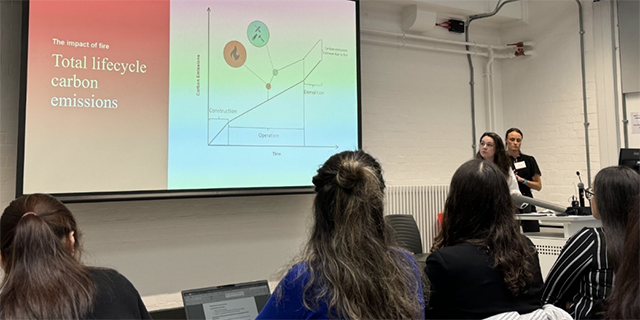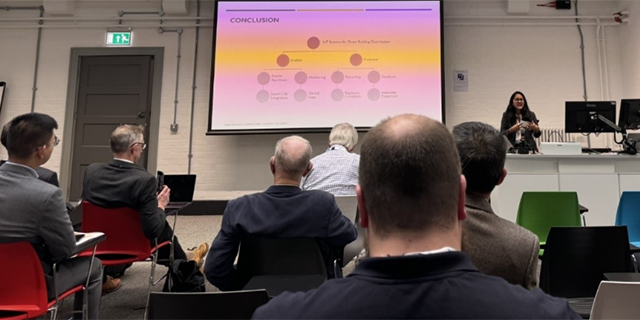
2024 CIBSE Technical Symposium: Diving Into Future Building Services
The 2024 CIBSE Technical Symposium focused on improving building performance for the future, considering factors like the digital revolution, impacts of climate change, health and wellbeing and the renewed imperative of building safety.
The 2024 Technical Symposium hosted by the Chartered Institution of Building Services Engineers (CIBSE) was held at the Welsh School of Architecture at Cardiff University from April 11-12. The 2024 CIBSE Technical Symposium focused on improving building performance for the future, considering factors like the digital revolution, impacts of climate change, health and wellbeing and the renewed imperative of building safety. It aimed to ensure that both new and existing buildings are well-equipped to meet these evolving challenges.
The symposium provided the opportunity for manufacturers, regulators and building services designers from across the UK and beyond to share knowledge and experience through papers, case studies, opinion pieces and reviewing research findings.
While there were several topics of focus discussed during the two-day event, some common themes were the challenges of embodied carbon considerations, the increase of smart building systems and the challenges and benefits of applying technology and modern design methods to existing buildings.
Achieving Embodied Carbon Targets Within the Building Sector
One of the key messages consistent across many sessions was that the industry is no longer focused on net zero as a target, but rather is focused on improvements in the techniques, strategies and frameworks available to evaluate and achieve these targets.
The design of building services presents some of the biggest challenges, attempting to balance the regulatory and client-driven targets across water efficiency, energy efficiency, embodied carbon and net zero designs. A case study presented at the symposium delved into this from a plumbing perspective comparing the carbon impacts of water recycling systems within an office building.
The selection of the most water-efficient or energy-efficient products may not enable a designer to meet their embodied carbon objectives. There are also important factors to consider when selecting products and designing systems for a whole-life assessment of a building’s service performance and efficiency over its lifespan.
Both presenters and audiences generally agreed that access to accurate information is crucial for making well-informed decisions. Having access to consistent information on both product performance and embodied carbon assists designers with product selection and design considerations. This information is essential to manage embodied carbon objectives and water and energy efficiency targets.
This is an area of significant focus for the International Code Council, which is dedicated to developing solutions and frameworks to address the significant challenges that the industry is encountering worldwide. As a global leader in all areas of construction, the Code Council is uniquely placed to consider these issues across all sectors of the industry and collaborate with other organizations who share the same ambitions.
The Power of Smart Building Services
Another notable area of interest highlighted in several presentations was the rapid advancement of technological innovation across all building services. These advancements are opening pathways for optimizing system performance, made achievable through the integration of smart features into building services.
One session delved into how building efficiency can be enhanced through the integration of the Internet of Things (IoT), machine learning and data quality assessment. An exemplary case of innovation was showcased, demonstrating the optimization potential for hydronic heating systems. By leveraging data such as building/room occupancy and water temperature, along with the capability for remote control or isolation of system components, central water heaters can be optimized. This allows for precise control over the areas being heated and leads to substantial reductions in energy wastage through automated system optimization.
Data quality and data management were a highly interesting topic of discussion among some of the presenters. With more building service information becoming available, the data gathered can be used to both optimize the performance of the existing systems but also provide insight for future design considerations. While the ability to gain access to building service information is growing, a need to consider the quality and quantity of the data being gathered and the benefits of consistency was highlighted throughout the symposium.
Another example was a paper that presented key considerations around the quality, completeness, accuracy and consistency of data. It highlighted the importance of considering the level of detail and understandability of the information being recorded. All these areas require consideration to ensure that the information being used to make system design or optimization decisions can be relied upon for accurate outcomes. This was highlighted well by the Code Council’s research partners at the University of Miami who presented on the potential for uniform water system performance assessment and data extraction guidelines, which is tied to the research being conducted by the university in the development of the global plumbing pipe sizing standard – ICC 815 Sizing Water Distribution, Sanitary Drainage and Vent Piping Systems.
Furthermore, the rapid advancement of machine learning offers the capability to analyze vast amounts of data and interpret meaningful insights. This presents numerous benefits, including system optimization.
See Related: The Urgent Need to Address Water Scarcity Through Scientifically Supported Water Conservation Solutions

Existing buildings
Existing buildings present opportunities and challenges across all subjects raised by presenters and the audience alike. Given the relatively small amount of new construction compared to the existing building stock, enhancements in building codes and standards yield slow impacts on the overall benefits in areas like water and energy efficiency within the built environment.
While many countries are moving toward the electrification of buildings and a shift away from fossil fuels, this is one area that presents an opportunity to improve the performance of existing buildings, however, this also comes with significant challenges for building service designers.
Consideration of heat pump retrofit applications, optimization of the use of heat pump technologies and unlocking opportunities through retrofit methods, were some of the session titles discussing these challenges. Presenters provided research, case studies and opinion pieces, sharing their knowledge and experiences in navigating some of these challenges associated with improving the performance of existing building stock.
A final noteworthy presentation focused on on-site wastewater management, which attracted a lot of interest from the audience. The paper offered a comprehensive overview of our current global standing, emphasizing the disparities in access to and quality of sanitation worldwide. It provided a strong reminder that while many countries are very fortunate, others need more support. The presentation provided by the University of Miami demonstrated that through the development of a new standard ICC 825 – Residential Onsite Wastewater Treatment Facilities, a tool for improving sanitation globally may just be within reach.
Watch a recap from Drew Rich, BSC, CENG, Department of Civil and Architectural Engineering, The University of Miami, on his latest research: Developing a Uniform Water Supply Monitoring System: Water System Performance Assessment & Data Extraction Guidelines (Water-SPADE Guidelines). Rich presented as part of the Symposium and was interviewed at the event by Tom Roberts, Code Council Director of PMG Global.
Learn more about the Code Council’s PMG support and available resources here.








